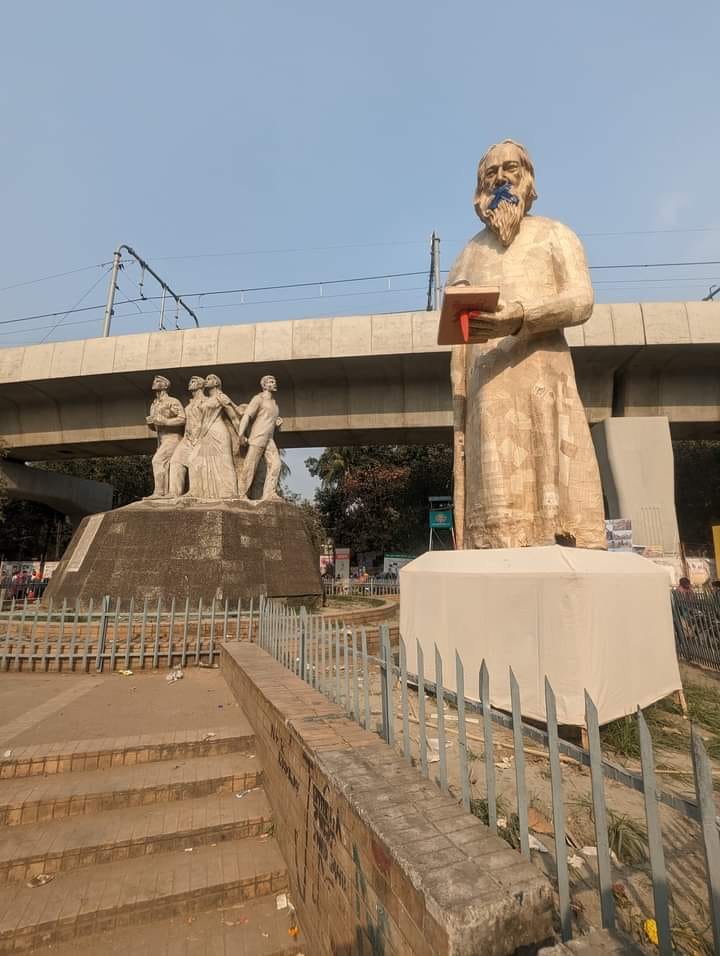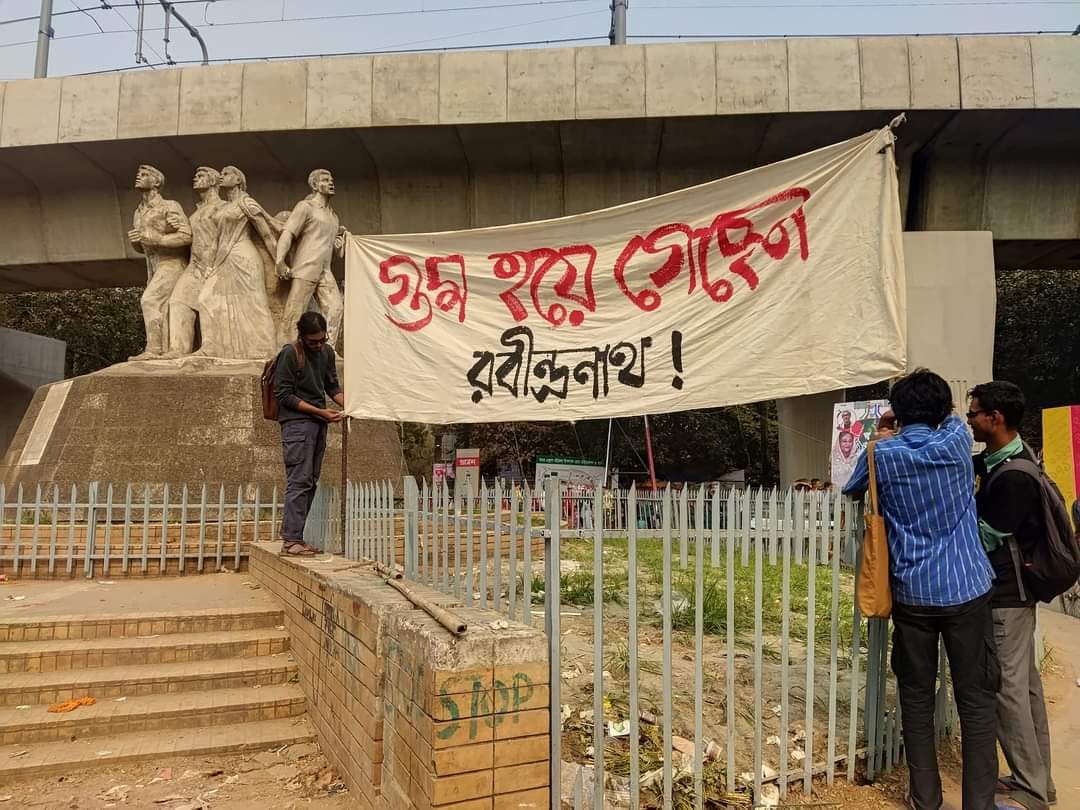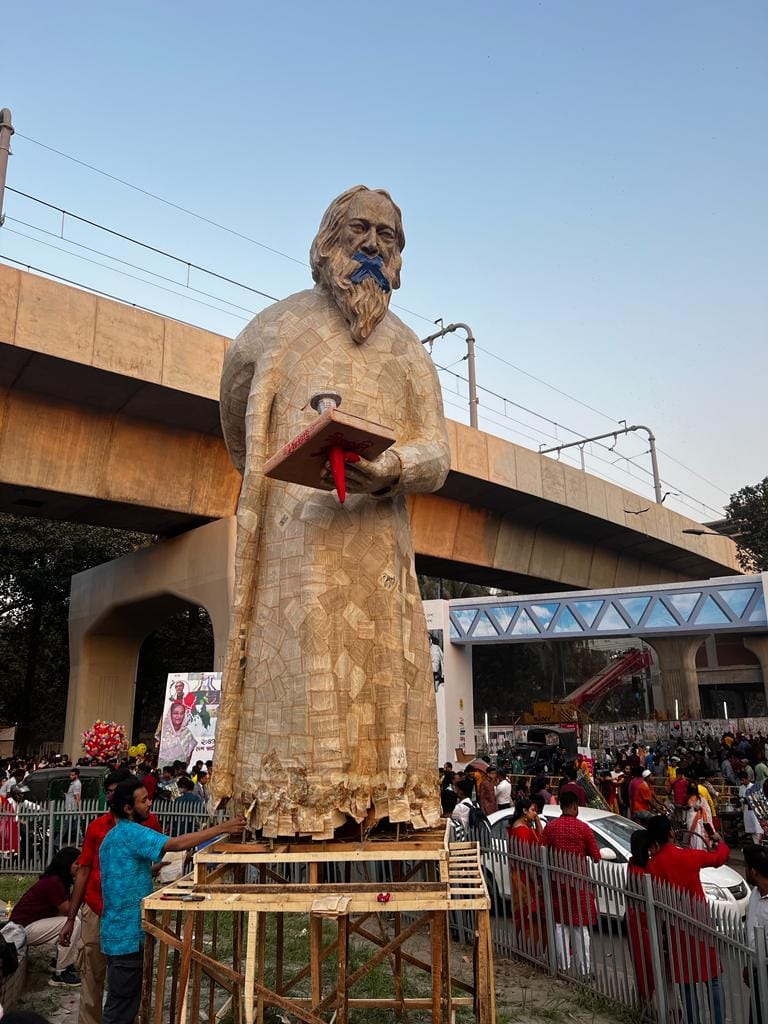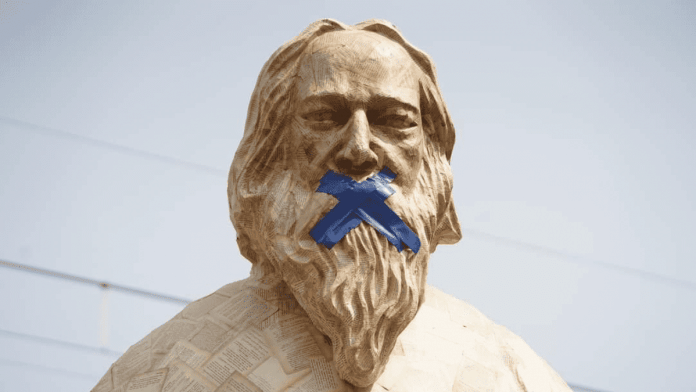Kolkata: Days after a newly-installed statue of Nobel laureate Rabindranath Tagore went missing from the campus of Dhaka University, it has been found in bits and pieces in a garbage dump and reinstalled. University authorities admit that they had the statue removed.
On 14 February, a section of students from Dhaka University’s Faculty of Fine Arts had put up the statue near the Raju Memorial Sculpture, a prominent landmark on campus.
Towering at 19.5 feet, the original statue was made of bamboo, thermocol, and pages torn out of discarded books and had bright blue tape pasted across its mouth. A nail, its pointed end painted scarlet, was driven through a book that Tagore held, making it look like it was bleeding.
The statue was meant as a mark of protests against the growing state censorship, students told ThePrint.
The statue vanished on 16 February but Saturday — three days after the statue disappeared — students of Dhaka University’s Faculty of Fine Arts, who made the original statue, said they found bits and pieces of it, including its head, in a garbage dump on campus and put it together.
The resurrected sculpture has Tagore’s head placed at an unnatural angle on bamboo scaffolding that loosely resembles an upright body.
Shimul Kumbhakar, a master’s student at Dhaka University’s Faculty of Fine Arts who was part of the team behind the statue, claims that the statute was meant to raise awareness of the importance of free speech.
“Tagore is a symbol of free thought and creativity, values that are important for our society,” Kumbhakar, who’s also a senior office-bearer of the Left-leaning Bangladesh Chhatra Union (BSU), told ThePrint, adding students want the sculpture to stay on display through February or at least till 21 February, which the country marks as Language Day to mark Bengal’s language movement.
But university authorities appear to be in no mood to relent.
“It was not a statue of Tagore but a caricature,” A.K.S Gholam Rabbani, proctor at Dhaka University, told ThePrint. “This is not university culture. This is apasanskriti (distorted culture) fuelled by some politics. And we will not allow it.”

Also Read: BJP’s ‘abuses’ as bad as Chinese repression, rights body warns investors shifting to India
‘Crackdown’
The drama over the statue erupted at a time when Bangladesh is holding its annual book fair, the Ekushey Boi Mela, on the Dhaka University campus.
It was at one of the entrances to this event that the sculpture was placed.

Hours after it was installed on 14 February, photos of the Tagore statue with its mouth taped shut — a symbolic act of protest — went viral.
After the statue went missing, students put up posters that read: “Even Tagore has been made to disappear”.
That, too, went viral.
On 18 February, social media was once again flooded with pictures from the campus of bits and pieces of the missing statue, including the head.
Rabbani told ThePrint that this wasn’t the first time that the university has disallowed a statue on campus — the university had stopped students from installing one of Bangabandhu Sheikh Mujibur Rehman, the founder of Bangladesh.
“We stopped it not once but twice,” Rabbani said.
But BSU sees the university’s action as a crackdown on free speech — something that they had set out to protest in the first place.
“It (the crackdown) is so severe in Bangladesh, even Tagore can’t open his mouth here and because he protested by taping up his lips, he was made to disappear,” Rezwan Hoque Mukto, an office bearer of the BSU central committee, told ThePrint.
The union has also put up a banner next to the reinstalled statue. It reads: “Abolish the Digital Security Act and stop all kinds of censorship” — a message aimed at the Sheikh Hasina government.
Critics of the government claim the DSA, a law enacted in 2018, gives it sweeping powers to silence dissent.
Row over book fair
But while the DSA is the BSU’s big target, there was a more immediate trigger for the Tagore statue protest.

Just before the book fair was inaugurated by the prime minister herself on 1 February, a controversy erupted over organisers refusing to give a publisher, Adarsha Prakashani, a stall.
Critics called this an act of censorship, especially given that the publisher had planned to release three books that were critical of Prime Minister Hasina’s development model at the book fair.
While the high court ordered the organisers, Bangla Academy, to allot a stall, the Appellate Division of the Supreme Court stayed the order on 15 February.
ThePrint tried contacting Bangla Academy through calls and text messages. This report will be updated as and when a response is received.
Also Read: ‘Platforms like Twitter can’t decide what is free speech’ — Centre defends blocking orders in HC






